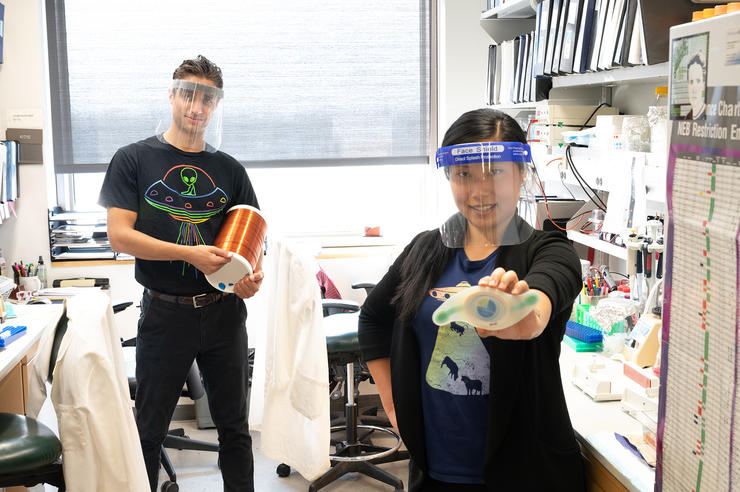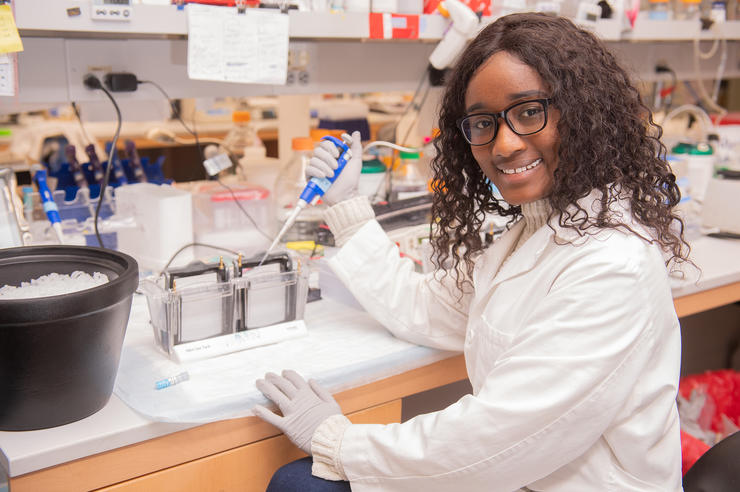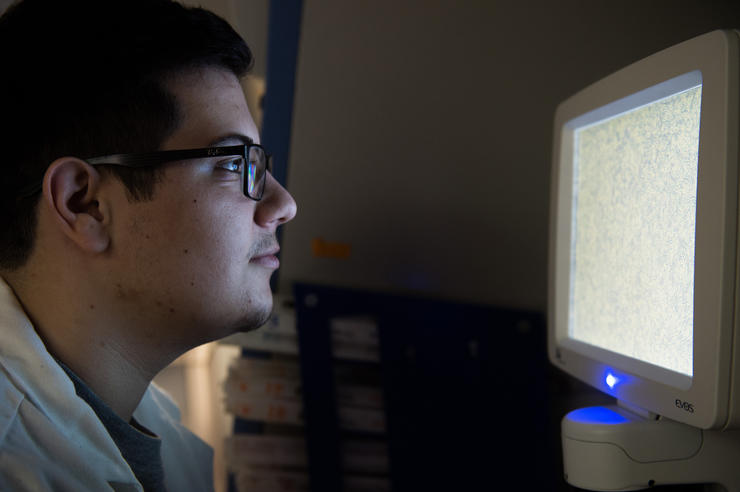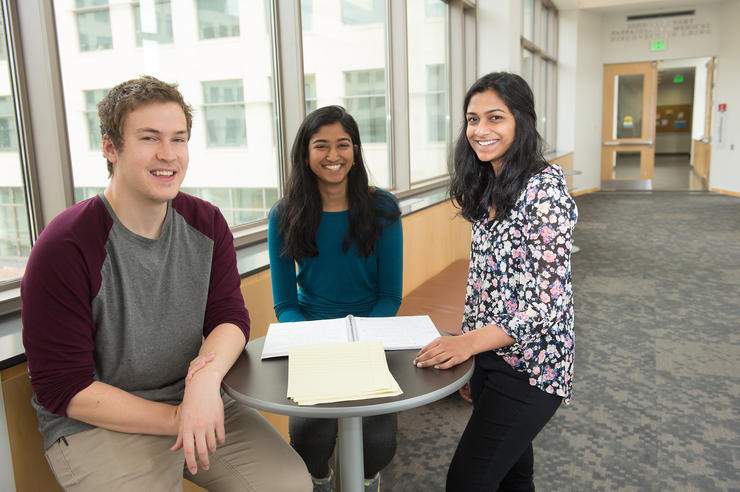Advancing science through mentoring
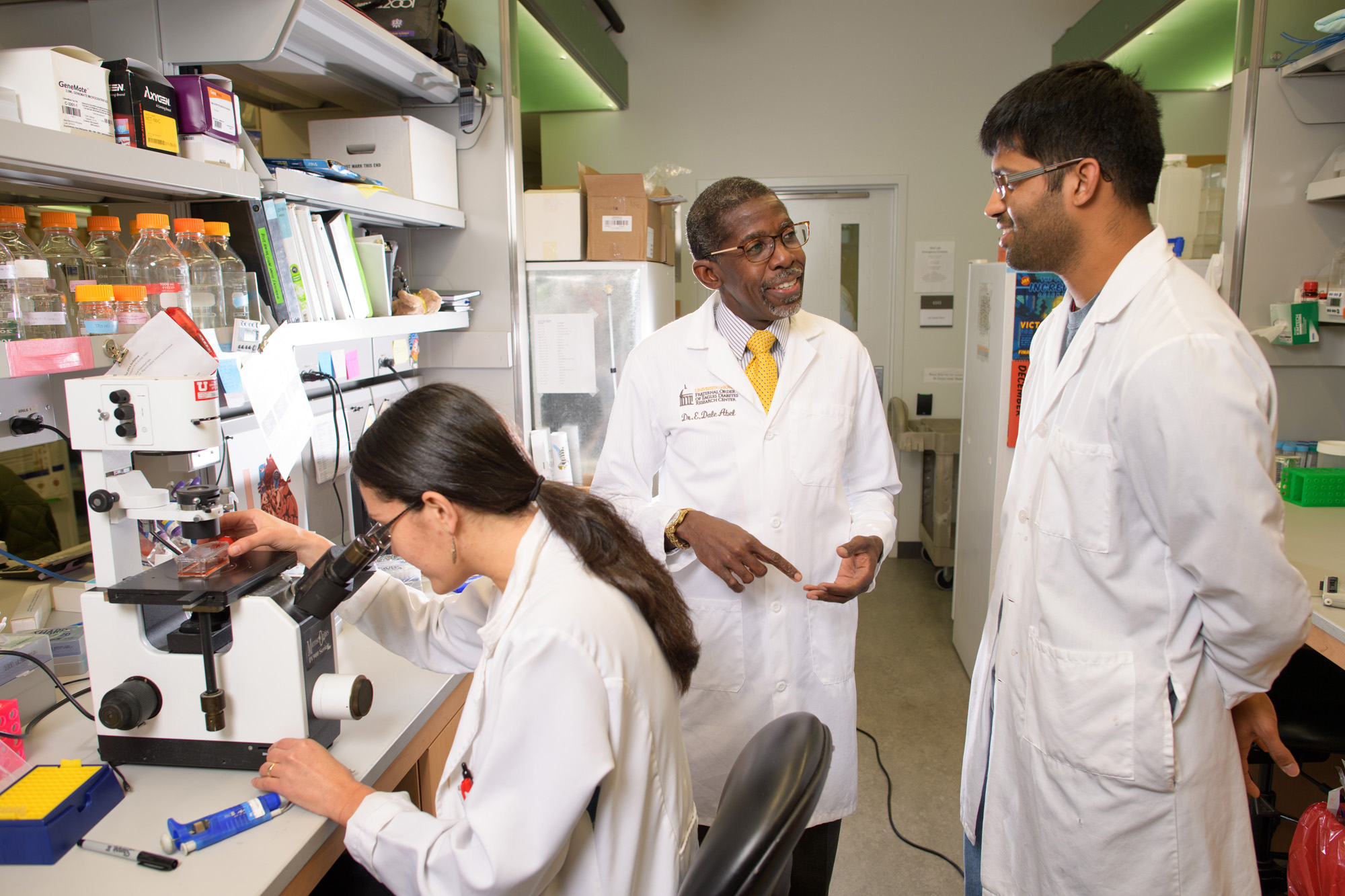
E. Dale Abel (center), chair of the Department of Internal Medicine in the UI Roy J. and Lucille A. Carver College of Medicine, visits with researchers in his lab in this 2017 photo. One of Abel’s priorities at Iowa is to cultivate and inspire young scientists: “I’m very committed to giving the same opportunities I had to as many as I can.”
When diabetes researcher E. Dale Abel was being recruited to the University of Iowa in 2013 to lead the new Fraternal Order of Eagles Diabetes Research Center (FOEDRC), he met individually with each member of his lab at the University of Utah to ask one question:
“Will you join me in Iowa City?”
All 13 said yes.
“I think the fact that everyone came here speaks very highly of Dr. Abel,” says Renata Pereira, who followed her mentor to Iowa and now is an assistant professor of internal medicine and a researcher in the FOEDRC. “Not only does he treat me with respect and value my opinions and suggestions, he has allowed me to contribute to his lab technically and conceptually. Meanwhile, he gave me great freedom to foster my own research interests. The more responsibility I’m given, the more I thrive. His mentoring style created a healthy environment for my growth.”
Abel credits his own successes to mentoring. “I’m where I am because of people who gave me a chance and opened doors for me,” he says.
After earning a medical degree from the University of the West Indies in Jamaica, Abel attended Oxford University as a Rhodes Scholar and later established research labs at Harvard and Utah. One of his priorities at Iowa is to cultivate and inspire young scientists. In fact, the motto of the Abel lab is “pay it forward.”
“In the Abel lab, I get to be around some of the smartest people on campus, and they are open and engaging and kind. Always willing to answer questions. I feel like I get special attention.”
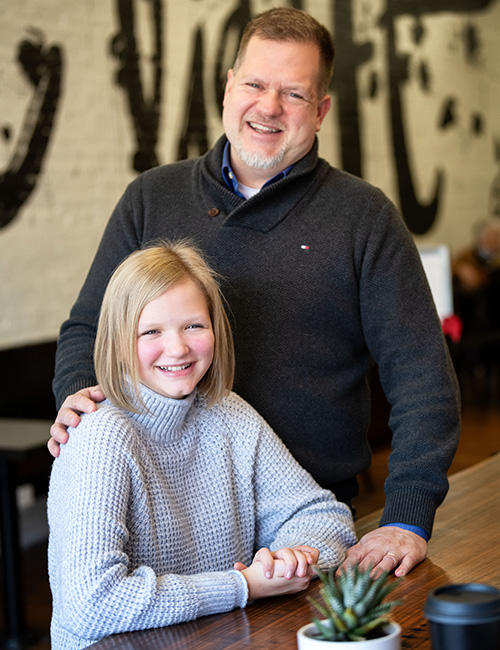
More than one in 10 Americans have diabetes, a chronic condition in which the body cannot effectively process blood sugar, and diagnoses are increasing around the world. Why? University of Iowa researchers are working to find answers—and improve the lives of those with the demanding disease.
“I’m very committed to giving the same opportunities I had to as many as I can,” says Abel, who studies the link between diabetes and heart disease in the FOEDRC and chairs the Department of Internal Medicine in the UI Roy J. and Lucille A. Carver College of Medicine. “We have some amazing undergraduate students at Iowa from all walks of life, many of them first-generation students and minorities who also have aspirations and goals to become doctors or scientists or other health care professionals. I open my lab to them and encourage many of the other folks here to let their labs be a sandbox where students can come and play.”
Doing so, Abel wagers, will kindle in them a passion for scientific discovery—and position them to advance knowledge of diseases like diabetes. He actively recruits minority students, helps lab members find project funding and the best conferences for presenting their results, and teaches junior faculty how to mentor undergraduates.
Kevin Kato is a senior biology major from West Des Moines. He knew that experience in a campus research lab would likely boost his medical school applications, but he says the two years he has spent in Abel’s lab mean much more than an entry on his résumé.
“In the Abel lab, I get to be around some of the smartest people on campus, and they are open and engaging and kind. Always willing to answer questions,” says Kato, who has been working with FOEDRC researcher Yuan Zhang and is an author on a research paper published in 2020 by Nature Metabolism. “I feel like I get special attention.”
Mentoring in the Abel lab goes beyond simply offering advice. It’s about setting up students for future success, from sharing tips on competitive grant writing to making introductions in key networks to checking in periodically on a more personal level. While undergraduates like Kato are paired with a junior faculty member or postdoctoral fellow for one-on-one mentoring, guidance and direction come from everyone involved with the lab, says 2020 graduate Margaret Mungai. She deferred a 2020–21 Fulbright grant to conduct research in Spain due to the pandemic and currently is in Berkeley, California, working on a joint diabetes research project with Iowa and the University of California at Berkeley.
“When I was preparing for one of my first national conferences as an undergraduate, Dr. Abel had me present my research at one of our weekly lab meetings, and then the whole lab went through each slide to make sure the presentation was good,” she says. “Dr. Abel was really invested in each one of us, whether we were undergrads, graduate students, or postdocs.”
The Fraternal Order of Eagles Diabetes Research Center at the University of Iowa is a premier research institute focused on advancing knowledge of the pathophysiology of diabetes and its complications.
Abel also teaches his mentees how to be good mentors and has them build individual development plans for their students. Antentor O. Hinton Jr., a postdoctoral research fellow who joined Abel’s lab in 2016, says being a mentor has made him a better scientist.
“As a postdoc, I’m required to do research, and that’s it—but the highlight of the lab is mentoring,” says Hinton, who was recognized in 2020 for excellence in mentoring by the Louis Stokes Alliances for Minority Participation. “I am so proud of my students. Working with them makes me better. They challenge me and show me my flaws. That helps them grow, and it helps me grow. It improves my own training and shows me how to run a lab.”
Hinton heads to Vanderbilt University in the fall as an assistant professor of molecular physiology and biophysics. While Abel would prefer to keep on campus the young scientists who move through his lab, he says the mentoring they receive and give at Iowa will pay dividends for years to come in the arena that matters most: scientific discovery.
“We can’t keep everybody here, but I certainly want us to be known not only as a place for doing innovative and cutting-edge diabetes research but also as a place where people can train to be future investigators,” he says. “In doing so, we play an important role in building up the bench.”
